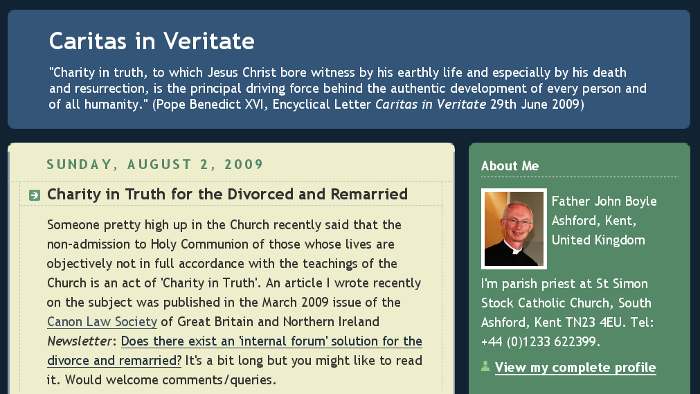
Father John Boyle, fra Erkebispedømmet Southwark i England er tilbake som blogger – etter en lang pause. Hvorfor er han så tilbake med en ny blogg? Slik svarer han:
Firstly: The words at the top of this blog (Caritas in Veritate) summarise all that motivates me as a priest and as a human being. I may myself be far from a perfect example of an authentically developed person, but this project is one for a lifetime. …
Secondly: many people have expressed regret that I had pulled out of the blogosphere. They were very kind and charitable. I believe they spoke sincerely and truthfully.
Thirdly: I was at Father Finigan’s happy Silver Jubilee celebrations last Tuesday. It was of course a wonderful celebration for the parish and by the parish. … But it also brought many who communicate through the blogosphere together, those who write their own blogs or comment on blogs. It’s a good community and provides great mutual support. I want to be part of that, to both receive and contribute.
Han skriver også en av de første dagene om en artikkel han nylig fikk trykket i Canon Law Society, om spørsmålet om skilte og gjengifte katolikker; kan de motta kommunion? Noen prester (også i Norge) hevder at de kan det; hvis de selv er overbevist om at deres første ekteskap er ugyldig, kan presten i det såkalte «interne forum» gi dem tillatelse til å motta kommunion, selv om deres første ekteskap ikke er annulert, og selv om de ikke er gift i Kirken. Jeg har aldri forstått hvordan noen prester kan gjøre dette, og Father Boyle hevder også i sin (lange) artikkel at det er umulig. Slik konkluderer han:
It is now not at all uncommon for pastors to have within their flocks Catholics 1) who are in irregular marital situations following the breakdown of a previous marriage, or 2) who have married outside the Church in ignorance of the Church’s law concerning Canonical Form, or 3) who are simply living together without getting married or who, for some reason, have married civilly but are not prepared to marry ecclesiastically.
The situation of the second group above can be remedied with relative ease provided there is no impediment. They should be offered the possibility of convalidation or, where this would not be possible, sanation. They could then be re-admitted to the sacraments. People in the third group may not be admitted to Holy Communion until they marry according to the law of the Church.
This paper has dwelt on the situation of those in the first group. Given the repeated and consistent teaching of the Church’s magisterium on this matter, it can only be a matter of great surprise, and even of grave concern, that there are still some clergy who consider the so-called ‘internal forum solution’ as an option. Those who are divorced and remarried, if they are unable to separate for a just reason, must either agree to the ‘brother and sister’ solution and have recourse to the sacraments remoto scandalo (i.e. ensuring that all possibility of scandal has been removed e.g. by receiving Communion in a place where their condition as divorced and remarried is not known), or submit their previous union to the ecclesiastical tribunal for a judgement as to the nullity or otherwise of that union, before validation of their current union and eventual re-admittance to the sacraments.
Hele hans artikkel kan leses her (pdf).
